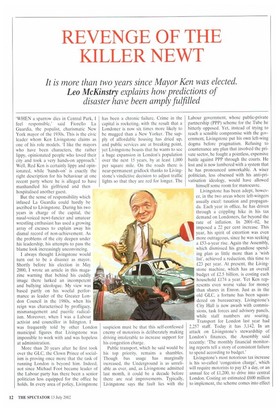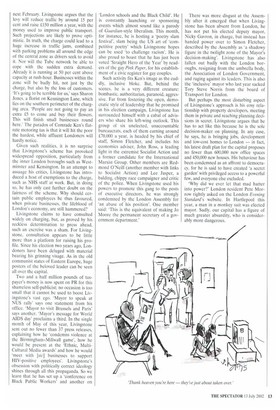REVENGE OF THE KILLER NEWT
It is more than two years since Mayor Ken was elected.
Leo McKinstry explains how predictions of
disaster have been amply fulfilled
'WHEN a sparrow dies in Central Park, I feel responsible,' said Flora° La Guardia, the populist, charismatic New York mayor of the 1930s. This is the civic leader whom Ken Livingstone claims as one of his role models. 'I like the mayors who have been characters, the rather lippy, opinionated people who loved their city and took a very hands-on approach.' Well, Red Ken is certainly lippy and opinionated, while 'hands-on' is exactly the right description for his behaviour at one recent party where he is alleged to have manhandled his girlfriend and then hospitalised another guest.
But the sense of responsibility which infused La Guardia could hardly be ascribed to Livingstone. During his two years in charge of the capital, the nasal-voiced newt-fancier and amateur wrestling enthusiast has used a growing array of excuses to explain away his dismal record of non-achievement. As the problems of the city deepen under his leadership, his attempts to pass the blame look increasingly unconvincing.
I always thought Livingstone would turn out to be a disaster as mayor. Shortly before his election in May 2000, I wrote an article in this magazine warning that behind his cuddly image there lurked an incompetent and bullying ideologue. My view was based partly on his woeful performance as leader of the Greater London Council in the 1980s, when his reign was characterised by profligacy, mismanagement and puerile radicalism. Moreover, when I was a Labour activist and councillor in Islington, I was frequently told by other London municipal figures that Livingstone was impossible to work with and was hopeless at administration.
More than 20 years after he first took over the GLC, the Clown Prince of socialism is proving once more that the task of running London is beyond him. Indeed, not since Michael Foot became leader of the Labour party has there been a senior politician less equipped for the office he holds. In every area of policy, Livingstone has been a chronic failure. Crime in the capital is rocketing, with the result that a Londoner is now six times more likely to be mugged than a New Yorker. The supply of affordable housing has dried up, and public services are at breaking point, yet Livingstone boasts that he wants to see a huge expansion in London's population over the next 15 years, by at least 1,000 per square mile. On the roads there is near-permanent gridlock thanks to Livingstone's vindictive decision to adjust traffic lights so that they are red for longer. The
suspicion must be that this self-confessed enemy of motorists is deliberately making driving intolerable to increase support for his congestion charge.
Public transport, which he said would be his top priority, remains a shambles. Though bus usage has marginally increased, the Underground is as unreliable as ever, and, as Livingstone admitted last month, it could be a decade before there are real improvements. Typically, Livingstone says the fault lies with the Labour government, whose public-private partnership (PPP) scheme for the Tube he bitterly opposed. Yet, instead of trying to reach a sensible compromise with the government, Livingstone put his own left-wing dogma before pragmatism. Refusing to countenance any plan that involved the private sector, he fought a pointless, expensive battle against PPP through the courts. He lost and is now lumbered with a system that he has pronounced unworkable. A wiser politician, less obsessed with his anti-privatisation ideology, would have allowed himself some room for manoeuvre.
Livingstone has been adept, however, in the two areas where left-wingers usually excel: taxation and propaganda. Each year in office, he has driven through a crippling hike in his tax demand on Londoners, far beyond the rate of inflation. In 2001-02, he imposed a 22 per cent increase. This year, his spirit of extortion was even more outrageous, since he was seeking a £53-a-year rise. Again the Assembly, which dismissed his grandiose spending plan as little more than a 'wish list', achieved a reduction, this time to £23 per year. At present, the Livingstone machine, which has an overall budget of £2.5 billion, is costing each household £174 a year. Yet Ken represents even worse value for money than shares in Enron. Just as in the old GLC, a fortune has been squandered on bureaucracy. Livingstone's City Hall is now awash with commissions, task forces and advisory panels, while staff numbers are soaring. Transport for London last year had 2,257 staff. Today it has 3,142. In an attack on Livingstone's stewardship of London's finances, the Assembly said recently: 'The monthly financial monitoring reports tell a story of consistent failure to spend according to budget.'
Livingstone's most notorious tax increase is his so-called 'congestion charge', which will require motorists to pay £5 a day, or an annual fee of £1,200, to drive into central London. Costing an estimated £600 million to implement, the scheme comes into effect next February. Livingstone argues that the levy will reduce traffic by around 15 per cent and raise £150 million a year, with the money used to improve public transport. Such projections are likely to prove optimistic. In truth, the charge could lead to a huge increase in traffic jams, combined with parking problems all around the edge of the central zone as drivers seek to avoid it. Nor will the Tube network be able to cope with the sudden extra demand. Already it is running at 50 per cent above capacity at rush-hour. Businesses within the zone will be badly hit, not just by the charge, but also by the loss of customers. 'It's going to be terrible for us,' says Sharon Jones, a florist on Kennington Lane, which lies on the southern perimeter of the charging area. 'People are not going to pay an extra £5 to come and buy their flowers. This will finish small businesses round here.' The paradox of Comrade Ken's flatrate motoring tax is that it will hit the poor the hardest, while affluent Londoners will hardly notice.
Given such realities, it is no surprise that Livingstone's scheme has provoked widespread opposition, particularly from the inner London boroughs such as Westminster and Kensington. In an attempt to assuage his critics, Livingstone has introduced a host of exemptions to the charge, such as NHS staff at work. But, in doing so, he has only cast further doubt on the fairness of the scheme. Why should certain public employees be thus favoured, when private businesses, the lifeblood of London's economy, are still hammered?
Livingstone claims to have consulted widely on charging, but, as proved by his reckless determination to press ahead, such an exercise was a sham. For Livingstone, consultation appears to be little more than a platform for raising his profile. Since his election two years ago, Londoners have been deluged with material bearing his grinning visage. As in the old communist states of Eastern Europe, huge posters of the beloved leader can be seen all over the capital.
Two and a half million pounds of taxpayer's money is now spent on PR for this shameless self-publicist; no occasion is too small that it cannot be used to boost Livingstone's vast ego. 'Mayor to speak at NUS rally' says one statement from his office. 'Mayor to visit Brussels and Paris' says another. 'Mayor's message for World AIDS day' proclaims a third. In the single month of May of this year, Livingstone sent out no fewer than 37 press releases, explaining how he 'condemns violence at the Birmingham–Millwall game', how he would be present at the 'Ethnic, MultiCultural Media awards' and how he would 'meet with [sic] businesses to support HIV-positive employees'. Livingstone's obsession with politically correct ideology shines through all this propaganda. So we learn that he has set up a 'conference on Black Public Workers' and another on
'London schools and the Black Child'. He is constantly launching or sponsoring events which almost sound like a parody of Guardian-style liberalism. This month, for instance, he is hosting a 'poetry slam festival', slam being the US art of 'competitive poetry' which Livingstone hopes can be used 'to challenge racism'. He is also proud to boast that he has just been voted 'Straight Hero of the Year' by readers of the gay Pink Paper, for his establishment of a civic register for gay couples.
Such activity fits Ken's image as the cuddly, inclusive bloke. But, behind the scenes, he is a very different creature: bombastic, authoritarian, paranoid, aggressive. Far from fostering the open, democratic style of leadership that he promised in his election campaign, Livingstone has surrounded himself with a cabal of advisers who share his left-wing outlook. This group of six unelected, unaccountable bureaucrats, each of them earning around £70.000 a year, is headed by his chief of staff, Simon Fletcher, and includes his economics adviser, John Ross, a leading light in the extremist Socialist Action and a former candidate for the International Marxist Group. Other members are Redmond O'Neill (another member with links to Socialist Action) and Lee Jasper, a balding, chippy race campaigner and critic of the police. When Livingstone used his powers to promote this gang to the posts of executive directors, he was strongly condemned by the London Assembly for 'an abuse of his position'. One member said: 'This is the equivalent of making Jo Moore the permanent secretary of a government department.' There was more disgust at the Assembly after it emerged that when Livingstone has been absent from London, he has not put his elected deputy mayor, Nicky Gavron, in charge, but instead has handed power over to Simon Fletcher, described by the Assembly as 'a shadowy figure in the twilight zone of the Mayor's decision-making'. Livingstone has also fallen out badly with the London boroughs, resigning from the umbrella body, the Association of London Government, and raging against its leaders. This is also the 'inclusive' mayor who last year sacked Tory Steve Norris from the board of Transport for London.
But perhaps the most disturbing aspect of Livingstone's approach is his cosy relationship with property developers, meeting them in private and reaching planning decisions in secret. Livingstone argues that he has to act like this because he is the sole decision-maker on planning. In any case, he says, he is bringing jobs, development and low-cost homes to London — in fact, his latest draft plan for the capital proposes no fewer than 600,000 new office spaces and 450,000 new houses. His behaviour has been condemned as an affront to democracy, for he is said to have created 'a secret garden' with privileged access to a powerful few, and everyone else excluded.
'Why did we ever let that mad hatter into power?' London resident Pete Morrow rightly asked on the London Evening Standard's website. In Hartlepool this year, a man in a monkey suit was elected mayor. Sadly, our capital has a figure of much greater absurdity, who is considerably more dangerous.



































































 Previous page
Previous page